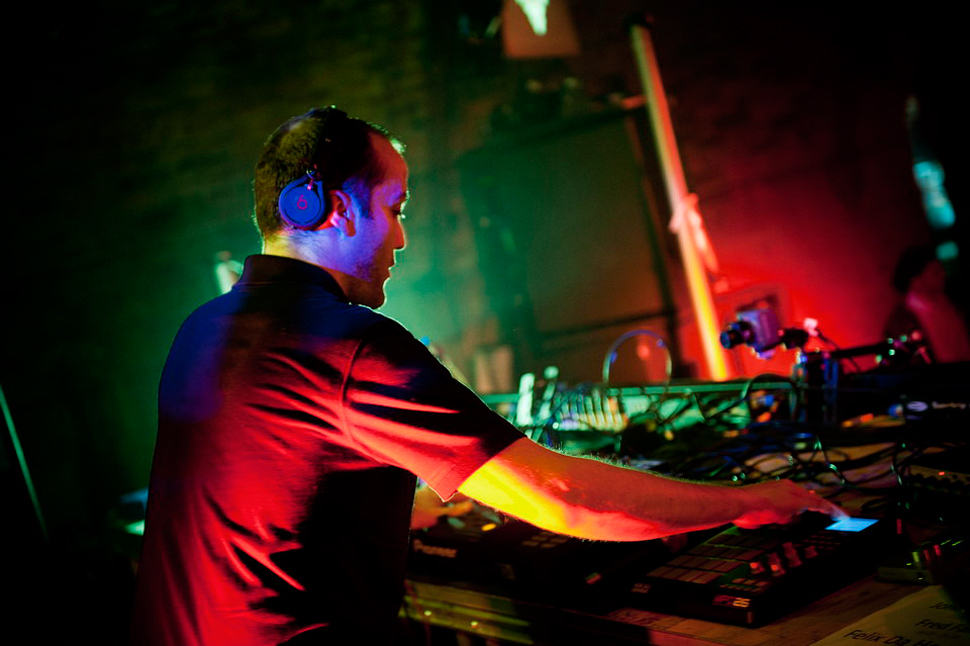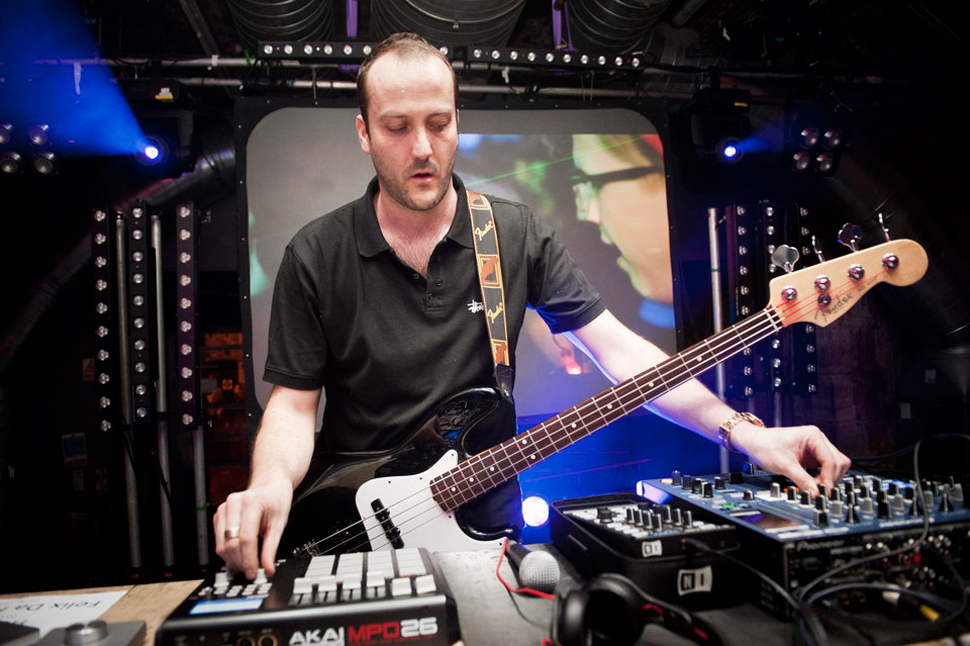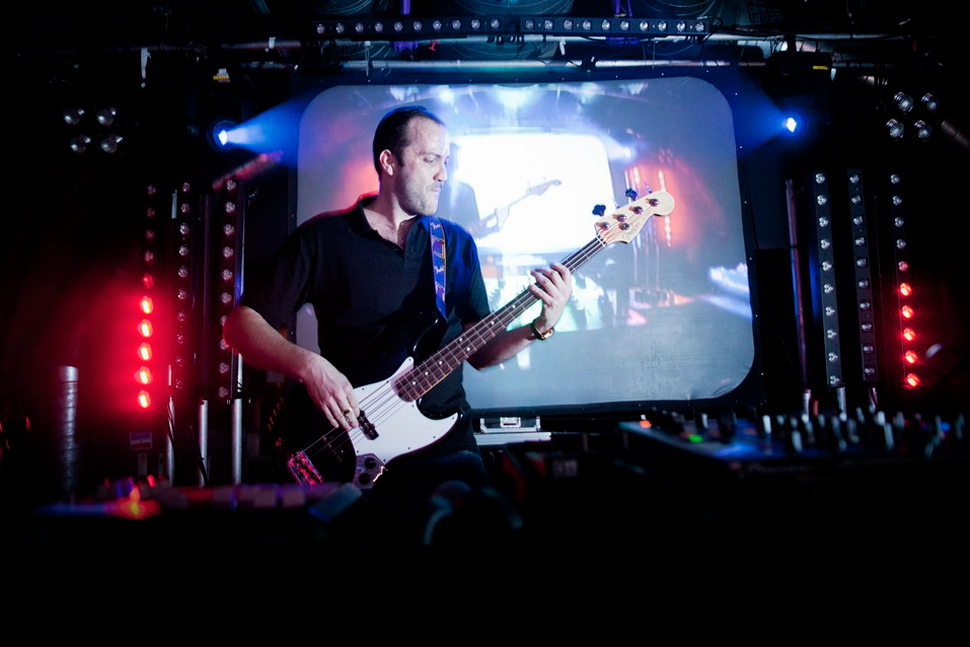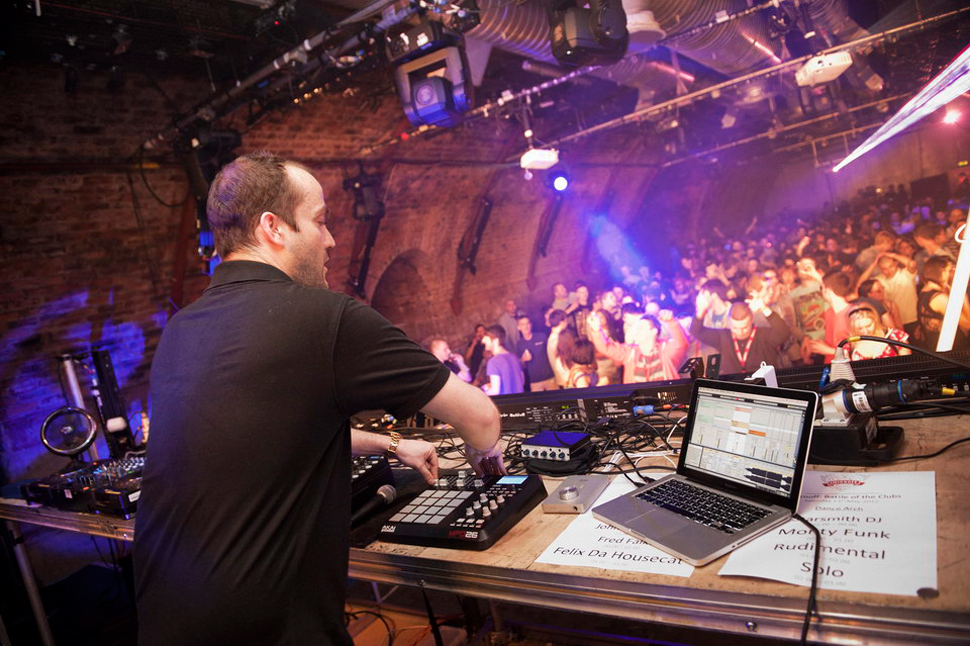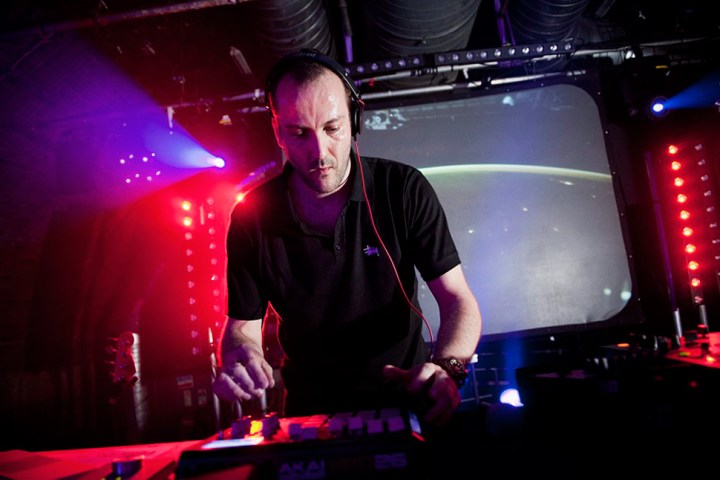
“No matter how sad you get or what bad things happen, you have to keep going.”
He’s got the touch — literally. Fred Falke set le bar for the French touch scene ’round the turn of the century with the throbbing wash of 808 PM at the Beach and Intro, a collaboration with Alex Braxe that used a key sample from The Jets’ 1987 hit, Crush on You, to great swirling effect, becoming a major low-end club anthem in the process.
That success ultimately led Falke to the forefront of prime international DJing gigs and high-profile remixes for artists like Ellie Goulding, Foxes, Gossip, U2, Tiesto, and Selena Gomez, to name but a few. “Remixing is not the same as when I write the music for myself, or if I produce for other people,” Falke says. “But all of those things are different parts of me. I need to do the remixes because I have these ideas that are not the same for when I write my own music.”

And when Falke writes, he writes deep and wide, as evidenced by the sounds on his new EP Alpha, out now digitally via Pantheon Musique. Alpha sets the template for the full album Falke’s working on for release sometime in 2016. From the funky callback to “that sweet sound” of Radio Days, to It’s a Memory, a heady collaboration with Mansions on the Moon that lyrically and aurally invites listeners to “float into a beautiful sky.” In short, Alpha rides adrift on a sheer wave of memory bliss, house style. Mais oui!
“I love to collaborate with people. That was the idea of the EP,” explains Falke. “Whenever I’m writing, I want to work with different people. I come from a band background, so, to me, music is about sharing — not only when the record is done in terms of sharing it with other people, but also sharing that moment in the studio with other artists. That moment becomes unique, and that’s the beauty of it.”
Digital Trends got on the horn with Falke, a native Frenchman, during a tour stop in Brooklyn to discuss bass and compression, balancing hi-res inclinations in a streaming universe, and his reaction to the Paris terrorist attacks.
Digital Trends: It’s nice to have something out there called Radio Days in these days of, well, non-radio. (Falke laughs) Tell me about the gear and plug-ins you’re using on that song.
Fred Falke: Well, first, those are real instruments. Guitar, piano, and bass are the roots, and the drums were programmed. Everything has been done into Ableton. Even though the mix after it was done on Pro Tools, I’m still very fast on Ableton. On the vocal, I used the iZotope compressor plug-in, Alloy 2; it works wonders. I use it because I love it.
For compression, it depends on the sound I want. I used to use all these different plug-ins, but I was watching pictures of studios from back in the day, and it was all pretty basic. I’m thinking, “Hmm, maybe I should go with something more simple, and go back to the time of working that way.” I thought it would be better to limit myself, instead of using tons and tons of different stuff.
You’re also a great bass player. You could be a top session guy, Fred.
I’ve always played with live instruments. When I first started in music, I went to this Berklee kind of school in France, and I wanted to be a session guy. That’s what I wanted to do. And I eventually ended up in the control room in the studio one day. I loved it so much that I started buying gear. That was the trap! (chuckles)
Bass is often the springboard for your mixes.
That tone cuts through every mix. It’s amazing. It’s really interesting that way. Sometimes I don’t start with bass specifically, but bass is very important to me. I really like when bass lines are melodic. Even simple melodies; I like that as well.
How do you think we should hear the music you make? Are you recording in high resolution, 96/24?
Yeah, I do, absolutely. When I started to make music — I didn’t know how to do it. Everything was done analog. After that, it took me some time to get into the computer, and then I understood how to get good results with it — the clarity, the depth, the channel separation; all of that.
When I record now, I work in 96k, because even though at some point it’s going to end up an MP3 or whatever, I think it’s very important to have the best quality to start with. You can always reduce the quality when you listen, but if you listen on a nice system, then you get the full experience.
Agreed. That way, you’ll get the full effect of the fine details, like what I call the constant “whoosh in” and “whoosh out” effect on All of My Love.
When we recorded that one, we used D/A converters, mixed at 96k on an analog board. Everything was mixed on tape, you know. I took the tape to the mastering studio. Watching the tape rolling and watching the needle moving to your song — to me, that’s an amazing feeling.
I cannot listen to MP3s — they’re a disaster!
And the sound of the tape — I love it. I’m a true believer in tape. The sound it gives to the music is a kind of low-end roundness, and the transients polish the highs. I think it’s because my ears have been educated with that sound. When I grew up, I listened to all these pop records and rock records, and soundtracks from the ’60s to the ’90s. There’s a nostalgia in my brain, or something.
What do you think about streaming services like Spotify?
I do use Spotify, but it just depends on where — in the street, in the car, in my hotel room; you can play it from everywhere. I’m glad to go on Spotify or go into Soundcloud to listen to my music.
Of course, the quality won’t be there, but when I go back home, I have my nice converter and my nice speakers. It’s two different types of music-consuming for me. I’d like to use this analogy: Sometimes it’s like you want scrambled eggs, and sometimes you want sunny-side up. It’s the same egg, just different options. (chuckles)
There is a renewed interest in the sound quality, and I think it’s great because it takes the audience, both the older and the younger crowd, into a new direction. That’s the whole point. You have to lead people to certain things because the younger crowd maybe thinks electronic music is only in the computer.
It’s just a matter of showing all the options to people. It was the same for me. When I started out, I didn’t know what a good converter was until someone showed me the differences and showed me the options I had.
When I’m listening to music through the high-end converters, I find I cannot switch back from that to MP3 — otherwise, it’s a disaster! When I started to really get into digital-to-analog conversion, I spent hours in my studio listening to all this music I knew for ages, rediscovering completely the soundfield, reverbs, things with cymbals — I was discovering things I didn’t even know were there. I was like, “What???” (laughs)
So that’s why I think it’s important to achieve the best quality so that people have the chance to listen to it on a great system, and maybe it will lead them to dig further and pay more attention to what they’re listening to. And I’m just about to buy a 384k converter, so… (laughs)
I can’t wait to hear what you’re going to do once you get your hands on that! I do have to say one of my favorite remixes of yours is of Magnificent, the U2 track. It seems even more poignant these days, considering everything that’s happened in the past month or so.
Ah yes, well, I’m a huge U2 fan, so I was proud to be approached to do that one. I kept the stems, the vocals, and some of The Edge’s guitar. The keyboards were a Korg Trident, and a Korg VST plug-in keyboard as well, for the pads.
I didn’t want to add too many layers to it. When one stereo track of synthesizer becomes six or eight, the mix becomes more and more complicated. I always tried to be as simple as possible there.
What kind of reaction did you get from U2 when the remix was finished?
It was grand! I sent the track to them, and they loved it! The feedback from the band, the management, and the label was that they all loved it. And the band listens to everything — they’re very adamant about what people do with their own music.
I really like when bass lines are melodic.
I’ve seen them live twice, and what amazes me each time I see them is the sound they have onstage — tremendous. It’s really impressive. U2 is a legendary group to me. They were already that way when I was in high school, with The Joshua Tree (1987). I grew up on that one.
The thing is, when you listen to a record like that, it’s a moment in time. And when you hear a record like that live 20 or 30 years later, sometimes you might be disappointed because your expectations are too high. But when I went to see them, it was the opposite. I was literally blown away. For just four people to sound as massive as they do — it’s ridiculous.
We’re talking, what, 28 years after that album came out? With or Without You still hits me as much and as deep today as when I first heard it.
A lot of people try to write a song that can carry the same emotion through time and make you feel the same way years and years after when it was written. With or Without You is exactly that kind of song. You feel the same emotion now; that’s crazy. That’s the magic of music.
Speaking of emotion, you must have felt awful about what happened in your native country last month at the Bataclan in Paris.
Yeah, that was very, very brutal. Very brutal. I was in France when it happened. I wasn’t in Paris. (pauses) Three people at my label were killed in the shooting. I heard about them two days later. It was completely… (pauses again) I just don’t know what the words are for it in English. It’s the first time in my life I’ve experienced that kind of situation. It was really brutal.
I was in New York on 9/11, and you instantly relate to that feeling whenever unspeakable things happen anywhere in the world. You have a connection to it that is a bit hard to explain sometimes how heavy it feels.
Exactly — that’s the word I was trying to say: connection. I didn’t know those people from my label or the band [Eagles of Death Metal] personally, but it felt like what happened in New York. The emotion makes you feel connected to so many people. It’s very intense.
I admire the way Eagles of Death Metal handled such a horrific situation. They showed the world that we’re not going to stop doing what we do and what we love because of terrorism.
Yes. You have to keep on going. No matter how sad you get or what bad things happen, you have to keep going.

